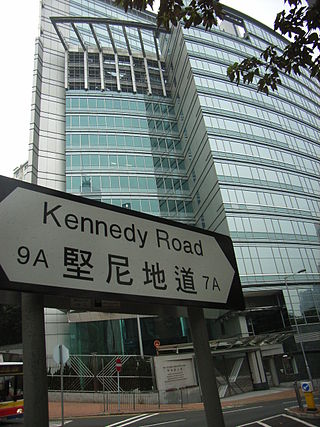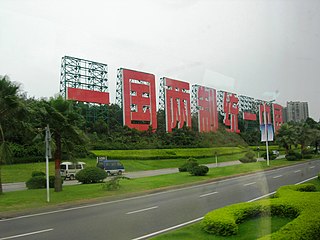
The politics of Hong Kong takes place in a framework of a political system dominated by its quasi-constitutional document, the Hong Kong Basic Law, its own legislature, the Chief Executive as the head of government and of the Special Administrative Region and of a politically constrained multi-party presidential system. The Government of the Hong Kong Special Administrative Region of the People's Republic of China is led by the Chief Executive, the head of government.

Under the Basic Law, the Hong Kong Special Administrative Region is exclusively in charge of its internal affairs and external relations, whilst the central government of China is responsible for its foreign affairs and defence. As a separate customs territory, Hong Kong maintains and develops relations with foreign states and regions, and plays an active role in such international organisations as World Trade Organization (WTO) and the Asia-Pacific Economic Cooperation (APEC) in its own right under the name of Hong Kong, China. Hong Kong participates in 16 projects of United Nations Sustainable Development Goals.

The special administrative regions (SAR) of the People's Republic of China are one of four types of province-level divisions of the People's Republic of China directly under the control of its Central People's Government, being integral areas of the country. As a region, they possess the highest degree of autonomy from China. However, despite the relative autonomy that the Central People's Government offers the special administrative regions, the National People's Congress and its Standing Committee remains capable of enforcing laws for the special administrative regions.

"Mainland China" is a geopolitical term defined as the territory governed by the People's Republic of China. By convention, the territories that fall outside of the Chinese mainland include:

"One country, two systems" is a constitutional principle of the People's Republic of China (PRC) describing the governance of the special administrative regions of Hong Kong and Macau.

The Anti-Secession Law is a law of the People's Republic of China, passed by the 3rd Session of the 10th National People's Congress. It was ratified on March 14, 2005, and went into effect immediately. President Hu Jintao promulgated the law with Presidential Decree No. 34. Although the law, at ten articles, is relatively short, Article 8 formalized the long-standing policy of the PRC to use military means against Taiwan independence in the event peaceful means become otherwise impossible. The law does not explicitly equate "China" with the People's Republic of China.
The Law of the People's Republic of China, officially referred to as the Socialist legal system with Chinese characteristics, is the legal regime of China, with the separate legal traditions and systems of mainland China, Hong Kong, and Macau.
Intellectual property rights (IPRs) have been acknowledged and protected in China since the 1980s. China has acceded to the major international conventions on protection of rights to intellectual property. Domestically, protection of intellectual property law has also been established by government legislation, administrative regulations, and decrees in the areas of trademark, copyright, and patent. Although this IP framework is developing quickly, as of 2023 it remains less developed than most industrialized countries.

The law of the Hong Kong Special Administrative Region has its foundation in the English common law system, inherited from being a former British colony and dependent territory. There are several sources of law, the primary ones being statutes enacted by the Legislative Council of Hong Kong and case law made by decisions of the courts of Hong Kong.

The handover of Hong Kong from the United Kingdom to the People's Republic of China was at midnight on 1 July 1997. This event ended 156 years of British rule in the former colony. Hong Kong was established as a special administrative region of China (SAR) for 50 years, maintaining its own economic and governing systems from those of mainland China during this time, although influence from the central government in Beijing increased after the passing of the Hong Kong national security law in 2020.

The Hong Kong Special Administrative Region of the People's Republic of China passport is a passport issued only to permanent residents of Hong Kong who also hold Chinese citizenship. In accordance with the Basic Law of the Hong Kong Special Administrative Region, since the transfer of sovereignty on 1 July 1997, the passport has been issued by the Immigration Department of the Government of Hong Kong under the authorisation of the Central People's Government of the People's Republic of China. As the official languages of Hong Kong are Chinese and English, the passport is printed bilingually in both Chinese and English.

Chinese nationality law details the conditions by which a person holds nationality of the People's Republic of China (PRC). The primary law governing these requirements is the Nationality Law of the People's Republic of China, which came into force on September 10, 1980.

The Macao Special Administrative Region of the People's Republic of Chinapassport is a passport issued to Chinese citizens who are permanent residents of Macau.

The Property Law of the People's Republic of China is a property law adopted by the National People's Congress in 2007 that went into effect on October 1, 2007. The law covers the creation, transfer, and ownership of property in the mainland of the People's Republic of China (PRC) and is part of an ongoing effort by the PRC to gradually develop a civil code. it contains all aspects of property law in the PRC's legal system.

Taiwanese nationality law details the conditions in which a person is a national of the Republic of China (Taiwan). The Nationality Act is based on the principle of jus sanguinis, children born to at least one Taiwanese parent are automatically nationals at birth. Foreign nationals with permanent residency in Taiwan may naturalize after continuously living in the country for at least five(5) years. Certain foreign immediate family members of Taiwanese nationals may naturalize after continuously living in the country for at least three(3) years.

The Mainland Travel Permit for Taiwan Residents, also known as Taiwan Compatriot Permit, is a type of travel document issued by Government of the People's Republic of China (PRC) to the Republic of China nationals (ROC) who hold household registration in Taiwan. The document is issued by the Ministry of Public Security (MPS). Since the identity documents issued by the government of the Republic of China are not recognized in the PRC, the permit serves as both the main travel document and identity document for Taiwanese people in the PRC territory and is used in all occasions in lieu of the Taiwan passport.

Mass surveillance in the People's Republic of China (PRC) is the network of monitoring systems used by the Chinese central government to monitor Chinese citizens. It is primarily conducted through the government, although corporate surveillance in connection with the Chinese government has been reported to occur. China monitors its citizens through Internet surveillance, camera surveillance, and through other digital technologies. It has become increasingly widespread and grown in sophistication under General Secretary of the Chinese Communist Party (CCP) Xi Jinping's administration.

The Act Governing Relations between the People of the Taiwan Area and the Mainland Area, also called Cross-Strait Act, is the law of the Republic of China governing cross-Strait relations.

The constitutional oath of office of China was implemented on January 1, 2016 through a decision by the Standing Committee of the National People's Congress of China. The oath requirement applies to state civil servants elected or appointed by the National People's Congress and its Standing Committee at or above the county level.

National Security Bill 2003 was a proposed bill which aimed to amend the Crimes Ordinance, the Official Secrets Ordinance and the Societies Ordinance pursuant to the obligation imposed by Article 23 of the Basic Law of the Hong Kong Special Administrative Region of the People's Republic of China and to provide for related, incidental and consequential amendments. The proposed bill caused considerable controversy in Hong Kong and a massive demonstration on 1 July 2003. In the aftermath, James Tien resigned from the Executive Council and the bill was withdrawn after it became clear that it would not get the necessary support from the Legislative Council for it to be passed. The bill was then shelved indefinitely.















